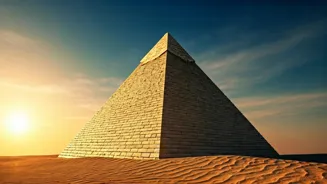Egypt: The Oldest Kingdom
The civilization of ancient Egypt stands as a beacon of human ingenuity, its roots firmly planted in the fertile soil of the Nile. This civilization is renowned
for its sophisticated culture, which flourished around 3100 BC, demonstrating remarkable achievements in art, architecture, and governance. The Egyptians erected majestic pyramids as tombs for their pharaohs, marking an enduring legacy that has captivated the world for centuries. Their complex religious beliefs, including the worship of numerous gods and elaborate rituals, were integral to their society, significantly influencing art, architecture, and daily life. Hieroglyphic writing, used extensively in religious texts and monumental inscriptions, represents a testament to their advanced literacy and cultural preservation. Furthermore, Egyptian innovations in mathematics, medicine, and engineering continue to inspire awe, showcasing the depth of their contributions to humanity's historical and cultural development.
India: The Indus Valley
India's ancient civilization showcases the earliest stages of urban planning and societal structures, dating back approximately to 3300 BC. The Indus Valley Civilization, also known as the Harappan Civilization, was notable for its advanced city planning, featuring organized grids and sophisticated drainage systems, demonstrating a remarkable capacity for infrastructure development. Their standardized weights, measures, and seals highlight their thriving trade and administration, reflecting a well-organized and centralized society. While the script of this civilization remains undeciphered, their contributions to urban development, craftsmanship, and trade reveal a complex, vibrant culture. The cultural and economic structures of the Indus Valley Civilization laid foundations which would become integral to South Asia's historical and social development.
China: Dynasties and Innovations
Ancient China, evolving along the Yellow River, boasts a civilization with a rich history, beginning around 2200 BC. Chinese societies experienced a series of dynasties that shaped their history, beginning with the Xia Dynasty. The development of writing, art, and philosophy laid a solid foundation for societal and cultural expression. The Great Wall of China, a testament to the architectural mastery of this civilization, showcased strategic planning. The innovations in technology, including the invention of paper, gunpowder, and the compass, transformed the world. The Chinese civilization, through its dynasties, offered remarkable advancements in the arts, science, and governance, establishing its influence across Asia and beyond.
Iran: The Persian Empire
The ancient civilization of Iran, particularly the Persian Empire, rose to prominence around 550 BC, originating from the Achaemenid dynasty. The empire showcased a vast territorial control, spanning across various territories and cultures. Their system of governance, which included satrapies or provinces, demonstrated an efficient management structure, ensuring effective administration. Their cultural achievements included the construction of grand palaces like Persepolis, reflecting imperial power and artistic sensibilities. Zoroastrianism, a significant religion, influenced ethical and philosophical frameworks. The Persian Empire's contributions to administration, art, and culture, along with its extensive expansion, shaped much of the ancient world.
Greece: Philosophers and Democracy
Ancient Greece, flourishing from approximately the 8th century BC, has had a pivotal impact on Western civilization. The Greeks are celebrated for their contributions to philosophy, including figures like Socrates, Plato, and Aristotle, significantly shaping modern thought. The development of democracy in Athens marked a pivotal moment in the evolution of governance, establishing principles of citizen participation and political discussion. Their advances in art and architecture, including the construction of temples and sculptures that portrayed human form and classical ideals, demonstrated artistic excellence. Furthermore, the Greeks made crucial strides in mathematics, science, and literature, resulting in a lasting legacy in these areas that continues to influence our world.
Japan: The Jomon Period
Japan's early civilization, emerging during the Jomon period around 14,000 BC, offers a rich history. The Jomon period's culture demonstrated a distinctive way of life, focusing on hunting, gathering, and fishing. The development of pottery, a defining feature of this era, showcased creativity in early societies. Shinto beliefs, which were closely connected to nature, influenced Japanese traditions. These early influences laid the foundation for the development of Japanese culture, shaping its art, social customs, and spirituality. The legacy of this civilization continues to be reflected in modern Japanese culture, reflecting an ongoing connection to the country's rich past.
Ethiopia: Ancient Origins
The ancient civilization of Ethiopia, originating around the 1st century AD, reveals an ancient past. The Kingdom of Aksum, an essential hub, was a significant center of commerce and power. Christianity, adopted early on, became a key cultural and religious force. The remarkable architecture, like the obelisks of Aksum, reflected technical abilities and architectural genius. The development of the Ge'ez script, also used to record the kingdom's history, demonstrated a strong literacy culture. The early adoption of Christianity and the kingdom's role as a trading center in the Red Sea added to Ethiopia's significance within the region.














